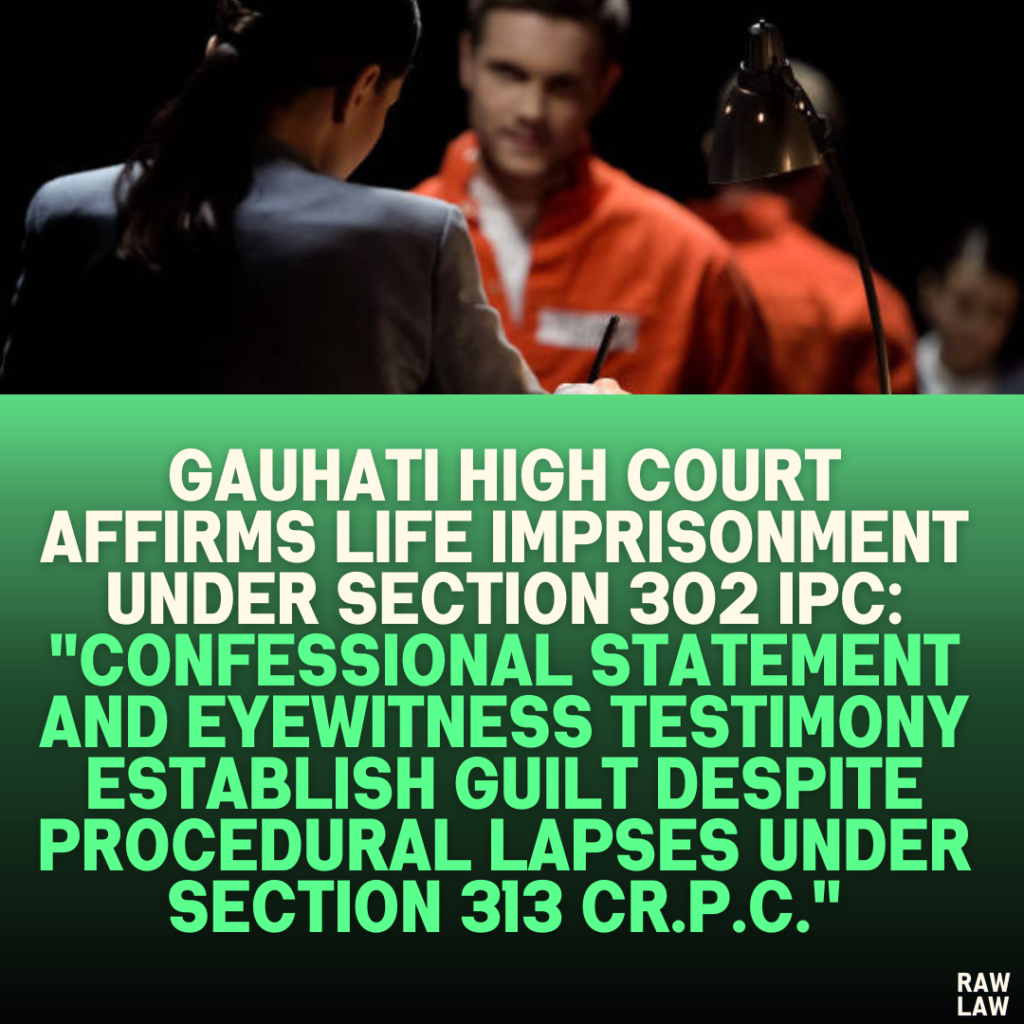Court’s Decision
The Gauhati High Court dismissed the criminal appeal filed by the accused, affirming his conviction under Section 302 IPC for murder and the consequent sentence of life imprisonment. The court concluded that the trial court’s findings were based on strong evidence, including an eyewitness account and the accused’s confessional statement. It rejected the contention that procedural lapses under Section 313 Cr.P.C. (not presenting all incriminating evidence to the accused) vitiated the trial, holding that such omissions did not cause prejudice in this case.
Facts
- Incident: On May 10, 1988, the accused, a worker at Cement Corporation of India (CCI), killed his colleague by striking him on the neck with a sharp weapon (dao) on a public road. The victim died immediately.
- Eyewitness: A security guard (PW-5) at CCI witnessed the accused committing the murder and raising a “hulla” (alarm).
- Surrender: After the incident, the accused went to the Bokajan Police Station, carrying the blood-stained dao, and surrendered himself.
- Complaint and Investigation: An FIR was lodged, and the police conducted an investigation, during which the accused voluntarily gave a detailed confession before a Magistrate under Section 164 Cr.P.C.
Issues
The court addressed the following legal questions:
- Validity of Confession: Was the confessional statement admissible as evidence?
- Procedural Fairness: Did the trial court’s omission to put all incriminating circumstances to the accused under Section 313 Cr.P.C. render the trial unfair?
- Sufficiency of Evidence: Did the evidence, including the eyewitness testimony and medical findings, establish the guilt of the accused beyond a reasonable doubt?
Petitioner’s Arguments
The defense raised procedural and substantive objections to the trial court’s judgment:
- Unfair Trial: It was argued that the accused was not informed of all incriminating circumstances during his statement under Section 313 Cr.P.C., thereby denying him a fair opportunity to defend himself.
- Reliance on Gobind Singhal Case: The appellant cited precedents like Gobind Singhal v. State of Assam, where procedural lapses were held to vitiate the trial.
- Retracted Confession: The accused contended that his confession was not voluntary and was recorded under duress, thus lacking evidentiary value.
Respondent’s Arguments
The prosecution maintained that:
- The conviction was supported by overwhelming evidence, including an eyewitness account, medical reports, and the confession.
- The procedural omission under Section 313 Cr.P.C. did not cause any prejudice to the accused, given the strength of the evidence.
- The confessional statement was recorded in compliance with all legal safeguards, including providing the accused adequate time for reflection.
Analysis of the Law
The court analyzed the legal framework and its application in this case:
- Confession Under Section 164 Cr.P.C.: The court noted that the confession was recorded after scrupulous compliance with legal requirements, including:
- The Magistrate ensuring voluntariness.
- The accused being given sufficient time to reflect.
- The absence of police influence during the recording process.
- Procedural Lapses Under Section 313 Cr.P.C.: The court held that procedural lapses do not automatically vitiate a trial unless the accused demonstrates actual prejudice. In this case, the overwhelming evidence negated any claim of prejudice.
- Eyewitness and Corroborative Evidence: The eyewitness testimony (PW-5) was corroborated by medical evidence, other witness accounts, and the confession, making the defense’s objections untenable.
Precedent Analysis
The court referred to key judgments:
- Nar Singh v. State of Haryana (2015) – Procedural lapses under Section 313 Cr.P.C. require the accused to show prejudice to invalidate the trial.
- Gobind Singhal v. State of Assam (2022) – Emphasized the importance of presenting all incriminating evidence to the accused but noted exceptions where overwhelming evidence existed.
- Bachan Singh v. State of Punjab – Highlighted the importance of voluntary confessions in criminal trials.
Court’s Reasoning
The court provided a detailed rationale for its decision:
- Credibility of Eyewitness Testimony: The testimony of PW-5, who witnessed the incident, was consistent and credible. The defense declined to cross-examine him, further bolstering the prosecution’s case.
- Validity of Confession: The confessional statement was detailed and voluntary, giving a vivid account of the murder. The accused’s retraction during trial lacked credibility, as the statement was recorded in the absence of police influence.
- Lack of Prejudice: The accused failed to demonstrate how the omission under Section 313 Cr.P.C. prejudiced his defense, particularly when key evidence like the confession and eyewitness testimony remained unchallenged.
Conclusion
The court dismissed the appeal and upheld the life sentence, stating that the trial court rightly convicted the appellant based on strong evidence. It held that procedural lapses did not undermine the fairness of the trial.
Implications
This judgment reinforces key legal principles:
- Weight of Confessions: A validly recorded confession, consistent with other evidence, can form the foundation of a conviction.
- Procedural Lapses: Minor procedural omissions, unless causing demonstrable prejudice, will not overturn convictions.
- Eyewitness Testimony: Corroborated eyewitness accounts remain a cornerstone of the criminal justice system.
